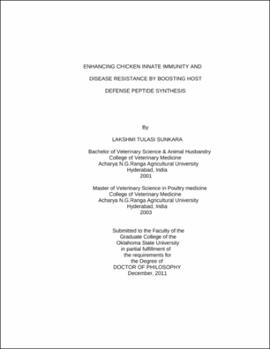| dc.contributor.advisor | Zhang, Guolong | |
| dc.contributor.author | Sunkara, Lakshmi Tulasi | |
| dc.date.accessioned | 2013-11-26T08:22:39Z | |
| dc.date.available | 2013-11-26T08:22:39Z | |
| dc.date.issued | 2011-12 | |
| dc.identifier.uri | https://hdl.handle.net/11244/6626 | |
| dc.description.abstract | Scope and Method of Study: Routine use of antibiotics for growth promotion and disease prevention in animal agriculture has caused the concern for rapid emergence of antimicrobial resistance in public health worldwide. In this study, we attempted an antibiotic-alternative approach to disease control and prevention by enhancing host defense peptide (HDP) synthesis and animal immunity. We evaluated a diverse group of dietary supplements for their capacity to stimulate chicken HDP gene expression in vitro and in vivo by real-time RT-PCR. Chicken infection studies were further conducted to confirm an enhanced resistance to Salmonella enteritidis following oral supplementation of selected dietary factors. We also evaluated the role of histone acetylation as well as cAMP and MAP kinase signaling in the transcriptional regulation of HDP synthesis in chicken HD11 macrophage cells. | |
| dc.description.abstract | Findings and Conclusions: Butyrate, a short - chain fatty acid and a well-known histone deacetylase inhibitor, enhances a large set of chicken HDPs and confers resistance to S. enteritidis. In addition, the induction of chicken HDP synthesis is largely inversely correlated with the aliphatic carbon chain length of free fatty acids, with short-chain fatty acids being the most potent, medium-chain fatty acids moderate, and long-chain fatty acids mostly ineffective. Desirably, free fatty acids enhance HDP expression with a minimum impact on proinflammatory response. Additionally, a combination of three short-chain fatty acids, namely acetate, propionate, and butyrate, induced HDP expression in a synergistic manner, leading to more significant reduction of the S. enteritidis load in the chicken than individual fatty acids. Moreover, cAMP signaling agonists stimulated chicken HDP gene expression and synergized with butyrate in HDP induction. We confirmed that p38 and JNK, but not ERK1/2, MAP kinase signaling pathways are involved in butyrate-mediated chicken HDP induction. Identification of potent HDP-inducing dietary supplements and a better understanding of transcriptional regulatory mechanisms of HDP gene expression will undoubtedly facilitate development of antibiotic-free approaches to disease control and prevention with applications in both animal and public health. | |
| dc.format | application/pdf | |
| dc.language | en_US | |
| dc.rights | Copyright is held by the author who has granted the Oklahoma State University Library the non-exclusive right to share this material in its institutional repository. Contact Digital Library Services at lib-dls@okstate.edu or 405-744-9161 for the permission policy on the use, reproduction or distribution of this material. | |
| dc.title | Enhancing chicken innate immunity and disease resistance by boosting host defense peptide synthesis | |
| dc.contributor.committeeMember | D'Offay, Jean M. | |
| dc.contributor.committeeMember | Teeter, Robert | |
| dc.contributor.committeeMember | Ritchey, Jerry W. | |
| osu.filename | Sunkara_okstate_0664D_11756.pdf | |
| osu.accesstype | Open Access | |
| dc.type.genre | Dissertation | |
| dc.type.material | Text | |
| dc.subject.keywords | camp signaling molecules | |
| dc.subject.keywords | chicken host defense peptides | |
| dc.subject.keywords | dietary modulation | |
| dc.subject.keywords | fatty acids | |
| dc.subject.keywords | histone deacetylase inh | |
| thesis.degree.discipline | Animal Science | |
| thesis.degree.grantor | Oklahoma State University | |
